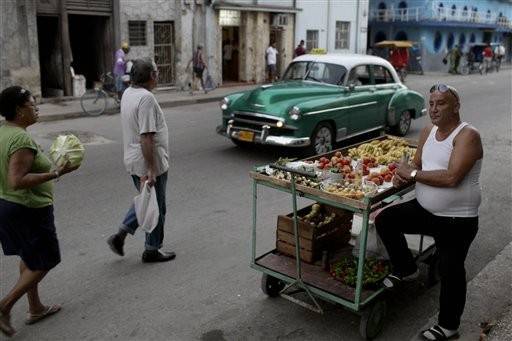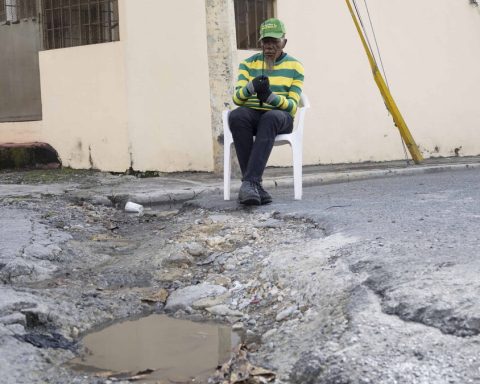HAVANA. AP. It is not every man for himself, far from it, but some mechanisms and forms of capitalism begin to slowly seep into the daily life of Cuba, while more than 460,000 people started their own businesses in the heat of economic reforms initiated by President Raúl Castro.
These days there are cafes, portals with pirated DVD offers, advertisements and small stands on almost every block and neighbors compete to win customers, guarding their businesses.
Street vendors walk through the streets with their proclamations and agricultural producers arrive at the market before dawn to obtain the best positions.
This limited but growing openness began to visibly alter the lives and attitudes of Cubans, sometimes coming into conflict with some ideals of the revolution.
Some fear, and others hope, that concepts stigmatized by half a century of revolution will return with the possibility, although limited, of making money and that people will directly and individually take advantage of the benefits of a business, without seeing them redistributed collectively.
“As the country grows, there will be more changes, it is something very positive,” Luis Antonio Véliz, owner of Fashion Bar Habana, a restaurant and cabaret, told the AP. “But some Cubans have difficulties understanding that not everything depends on the State anymore,” he warned.
Although a good number of these small businesses failed in the three years that the reforms took place, burdened by the lack of a wholesale market, stable supplies or by the few resources of their clients, those who did succeed entered into terrain unknown since the 1950s. .
An example of how a person’s life was transformed is precisely that of Véliz.
Initially opened to the public three years ago in a peripheral neighborhood of the city, Fashion Bar Habana has just been moved by its owner to the heart of Old Havana, where more people and tourists circulate. But with success, came sacrifice.
Véliz had to learn to compete to win clients, sometimes he neglected his family or was left without vacations and discovered that owning a small business is a 24-hour task, something unthinkable for him when he was an employee with a state salary. .
«I learned about the need for work performance. When you work for yourself you must look after your own interests,” said Veliz. “I’m tougher, stronger, more confident.”
The law of the market visibly dominates places like Egido Street, in the historic center of the capital, with its forklift drivers, cars that blow smoke from their exhaust pipes, and pedicabs that dodge people.
Many entrepreneurs sought to take advantage of the large flow of passersby and settled there and in one block – around an agricultural market – there are at least seven cafes, 13 flower stalls, photographers, document laminators, plumbers and jewelry sellers.
A competition that is joined by street vendors who also display their merchandise daily in the sector.
“Here sales are based on quality, innovation, we all compete to have a better product,” Yeska Estiu, a 44-year-old florist, told the AP.
The woman remembered how inventiveness helped her excel in her business, when she went to the store to look for a green spray – with which florists highlight the color of the ferns in the bouquets – and couldn’t find it.
She bought white paint, giving a distinguished touch of snow to the entire arrangement and it was liked so much by clients that soon her colleagues were imitating it.
“Self-employment generates possibilities to create, to impose quality, which is not bad,” said Estiu, who usually accompanies her flowers with silver papers and shiny ribbons.
The path is not without challenges to the values long cultivated by the revolution such as solidarity, unity and nationalist pride.
“I would like people to understand that there must not only be economic benefit, but also that they can contribute to social benefit,” Gilberto Valladares, 44, explained to the AP.
Better known as “Papito,” Valladares is the owner of Artecorte, initially a barbershop with elegant salons with high ceilings and plaster moldings. Later it added a museum of antiques about the trade and now it is also a local development project. The alley where he lives and works became a promenade full of plants and even a school to teach young people without a profession to be hairdressers.
“This sector (of entrepreneurs) is beginning to have an important weight in this society,” said Papito. “It is time to engage the new self-employed sector, socially,” added “Papito.”
For decades after the triumph of the 1959 revolution, Cuba endeavored to build a society of – as Commander Ernesto “Che” Guevara defined them – new men: capable of putting the interests of the collective before their own.
The State guaranteed all islanders work, housing and sufficient food. Low wages were compensated by free health and education and subsidized services.
But with the collapse of the Soviet Union in the 90s and the subsequent economic crisis, the closed Cuban society shook and its inhabitants found themselves having to think about their families and themselves first. At the same time, tourism and remittances began to flow.
To the point that for some experts the change in mentality of the present is a process that began two decades ago.
“There are probably (with the recent reforms) certain changes in the way of seeing things,” explained Cuban political scientist Armando Changuaceda, a researcher at the Universidad Veracruzana in Mexico. “But you can also see it from another side, society had already changed and the State and its policies had not.”
If ingenuity and individualism – “invent” and “solve” in street slang – in the 1990s served to survive, for some it is now synonymous with getting ahead.
A good number of Cubans, for example, are using their increased income to expand their homes, while buying clothes with designs from Spain or Miami.
At the same time, 1.8 million cell phones were reported – compared to 300,000 six years ago when they were restricted – and the use of a type of marketing technique became popular with managers and owners sending text messages to publicize offers from their restaurants or beauty salons, in a country where television and radio do not allow private advertising.
With weak finances and pressured by 50 years of US sanctions, Castro began a reform process in the country in 2010 whose objective was to unblock private initiative to achieve greater efficiency and relieve the swollen public workforce.
Liberation of the real estate market, credit policy, licenses for entrepreneurs, opening of cooperatives, authorization for individuals to sign contracts with the State and delivery of idle lands, were some of the measures approved.
Currently there are more than 460,000 independent workers, 200 cooperatives and thousands of hectares of land in usufruct.
On repeated occasions, Castro assured that updating the model did not in the least mean the privatization of key sectors for well-being such as health or education; while insisting that the goal is to perfect socialism and not embrace capitalism.
In addition, the government began a process to promote greater efficiency in large state companies and assured that no one will be left helpless, as was the revolutionary practice until now.
But for experts like Changuaceda, changes in the social structure are inevitable. “The reforms increase inequalities in a society that is already more unequal than in the decades from the 60s to the 80s,” explained the analyst. He fears that given the diminished capacity of the State, “the individualist” will emerge “as a response of many people” to the problems.
And with all this, some citizens feel distant from the reforms, such as those who were not able to start an activity or live on their state pensions equivalent to about 10 dollars a month.
“This is going from bad to worse,” 73-year-old retiree Manuela Peña said in a bad mood, standing in the doorway of her deteriorated house on Egido Street, while complaining about the prices.
But a few steps further away, a group of workers who now rent space for a cafeteria that was managed by the State for years, were enthusiastic, looking ahead to the future.
“It’s working for us more than before,” said 49-year-old Raidel Sánchez, dressed in an impeccable green uniform, one of the three brand new self-employed workers in the place, recently painted by themselves.
















